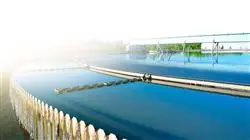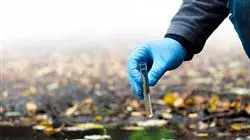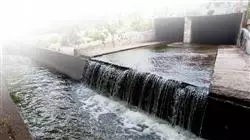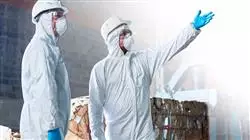University certificate
The world's largest faculty of engineering”
Description
A comprehensive and multidisciplinary educational program that will allow you to learn and integrate into your professional activity the latest advances in the field of water engineering"

The professional master’s degree in Water Engineering and Urban Waste Management is characterized by the deepening in these areas, from a comprehensive perspective, considering all the advances and interrelationships between both disciplines, including the most relevant aspects in legislation and circular economy.
In this way, the section on legislation offers the student a repository with all the legislation applicable to the topics covered during the Professional Master's Degree, facilitating its sectorial application. At the same time, the study of the circular economy is necessary because of its direct influence on water and waste management, a subject that is not covered by most of the master's degrees offered on the market.
One of the most interesting aspects of this Professional Master's Degree is the block dedicated to water management, in which the complete traceability of water is analyzed, from a chemical vision to its treatment as drinking water or wastewater. It also includes the use as an energy resource, through biogas or hydrogen vectors, an aspect to be taken into account in the coming years.
To conclude the study on waste, after a first module that covers from the classification and determination of waste, to the particularities of solid urban waste, industrial waste and hazardous waste, an in-depth analysis of all these types of waste is also necessary, given their coexistence in both urban and business environments.
It should be noted that as it is a 100% online Progessional Master's Degree, the student is not conditioned by fixed schedules or the need to move to another physical location, but can access the contents at any time of the day, balancing their work or personal life with their academic life.
A comprehensive study, covering knowledge of procedures for dealing with different types of urban waste"
This professional master’s degree in Water Engineering and Urban Waste Management contains the most complete and updated program on the market. The most important features include:
- The development of case studies presented by experts in water engineering and urban waste management
- The graphic, schematic, and eminently practical contents, with which they are created, provide scientific and practical information, on the disciplines that are essential for professional practice
- Practical exercises where self-assessment can be used to improve learning.
- Special focus on innovative methodologies in Water Engineering and Urban Waste Management
- Theoretical lessons, questions to the expert, debate forums on controversial topics, and individual reflection assignments
- Content that is accessible from any fixed or portable device with an Internet connection
Incorporate into your intervention and management capacity in the water sector, the most interesting innovations, through a high-quality and high-impact qualification"
It includes, in its teaching staff, professionals belonging to the field of and the management of Water Engineering and Urban Waste Management, who pour into this program the experience of their work, in addition to recognized specialists reference societies and prestigious universities.
The multimedia content, developed with the latest educational technology, will provide professionals with situated and contextual learning, i.e., a simulated environment that will provide immersive training, designed for training oneself in real situations.
This program is designed around Problem-Based Learning, whereby the professional must try to solve the different professional practice situations that arise throughout the program. For this purpose, the professional will be assisted by an innovative interactive video system, created by renowned and experienced experts in Water Engineering and Urban Waste Management.
With a specific approach, including interdisciplinary learning, it uses the synergies between Water Engineering and Urban Resource Management"

This 100% online professional master’s degree will allow you to combine your studies with your professional work. You choose where and when to train"
Objectives
The professional master’s degree in Water Engineering and Urban Waste Management, aims to provide students with the most updated knowledge and skills, in terms of new developments and protocols or techniques of action, in order to allow or boost their ability to work in this field.

An intensive and efficient study, which will allow students to acquire, complete or update their knowledge, getting up to date in all aspects of Water Engineering and Urban Waste Management”
General Objectives
- Know the latest applicable legislation that supports waste management and water engineering, allowing the student to know the legal instruments used in environmental management
- Apply the circular economy in water and waste management systems, using appropriate tools and methodologies quantify the economic and environmental impact of water and waste reuse and revaluation improvements in the organization
- Address the relationship between water and the environment and describe the physicochemical processes involved in a wastewater treatment plant, thus enabling the student to design equipment for a wastewater treatment plant
- In-depth study of the different energy carriers, such as biogas or hydrogen in its molecular form (H2), for its subsequent energy use, allowing the student to carry out designs based on hydrogen or biogas
- Acquire the knowledge of chemistry, related to its function, composition, structure and reactivity, in order to understand its importance in the life cycle and in the other fields that concern it
- Understand the processes involved in the potabilization of water for human and industrial consumption, as well as the analytical methods and management that control it, considering the costs in the service of drinking water
- Provide the student with the knowledge to identify waste, classify it and understand its flow
- Know the characteristics of waste and the problems involved in its management and final treatment
- Identify the origin of urban or municipal waste and the evolution of waste production
- Have key knowledge on the potential health and environmental effects of municipal waste and landfill issues
- Know the main digital technologies available in municipal solid waste management
- Know the optimal management of industrial waste, mainly through minimization at source and recycling of by-products
- Know the most relevant aspects of industrial waste, and the environmental legislation applicable to industrial waste management, together with the procedure for the correct management of industrial waste and its obligations as a producer
- Master the latest industrial waste treatment and disposal techniques
- Optimize industrial waste management by using waste minimization techniques
- Know the types of hazardous waste, generated depending on the sector, and the existing recovery options, providing the student with the skills to develop waste management plans and environmental awareness activities in different sectors
Specific Objectives
- Acquire knowledge of environmental law at the community, state and autonomous community levels
- Have an up-to-date legislation repository to ensure proper compliance with applicable regulations
- Know the necessary procedures for the figures of waste producer and manager
- Understand the requirements of the different environmental management systems, ISO 14001 and EMAS
- In-depth knowledge of the circular economy, for its strategic implementation, through proposals for the efficient and sustainable use of water and the revalorization of waste and by-products
- Measure, through life cycle analysis, eco-design and zero discharge tools, the environmental impact of products and/or processes, in order to develop improvement plans capable of becoming benchmark success stories
- Know the criteria of green public procurement, and the innovative public procurement tool to face and meet proposals derived from public administrations
- Establish an environmental accounting system to quantify and classify the proposed improvements and environmental costs, integrating it into the organization's accounting system
- Know the process steps of a wastewater treatment plant
- Design equipment such as tanks, piping, pumps, compressors and heat exchangers, as well as specific WWTP equipment dedicated to sedimentation or flotation
- Study biological processes and associated technologies such as biofilters, aerobic digesters or activated sludge digesters
- Understand technologies for nitrogen and phosphorus removal
- Study low-cost purification technologies such as lagooning and green filtering
- Learn more about the production, conditioning, storage and utilization of biogas
- Analyze the global energy landscape, as well as other energy solutions based on renewable energies
- Understand the hydrogen economy
- Study fuel cells, whose purpose is the production of electrical energy from hydrogen
- Discuss in detail the water molecule, structure, states of aggregation, chemical bonds, and physical and chemical properties
- Study the reactivity of the water molecule in organic and inorganic reactions
- Address the great importance of this molecule as a universal solvent in the cycle of life, also dealing with the main thermodynamic laws
- Delve into the different processes of water purification, and to know the components that determine its quality as drinking water
- Delve into the types and effects of contamination in drinking water, in order to subsequently study the processes of drinking water treatment
- Study water analysis methods in order to confirm its potability
- Understand the role of water in different industrial processes, to learn how to manage it as a resource
- In-depth study of the economic considerations and costs of drinking water services, in order to establish relevant actions to address the scarcity of fresh water, aligned with the strategies set out in the 2030 Agenda of the Sustainable Development Goals (SDGs)
- Know how to identify waste
- Identify and differentiate the types of existing wastes
- Understand, from a practical point of view, the different management options, the range of which opens up for different waste streams
- Be able to propose different treatment schemes, according to the waste characteristics
- In-depth knowledge of the existing problems related to waste production
- Analyze the evolution of waste production, by origin and type of waste
- Know how to analyze and assess the health and environmental impact of waste management
- Propose measures to reduce, recycle and reuse the waste generated
- Propose landfill management and restoration models
- Deepen in the latest digital technologies available in municipal solid waste management
- Know how to propose internal waste management models
- Know about the development and evaluation of waste management plans
- Have the capacity to reduce industrial waste, through the use of by-product bags
- Identify and understand the market for waste as a secondary raw material, understanding its market
- In-depth breakdown of the obligations of waste producers according to their sector of activity
- Analyze the type of waste generated by different activities
- Acquire transversal skills, necessary for work performance, in the new cultural frameworks of the current productive system
- Know how to manage waste, mainly hazardous waste, applying the regulations that regulate them
- In-depth study of valorization methods
- Develop environmental awareness activities

A complete course that will allow you to grow in your intervention capacity, with the security of a study in which theoretical growth is combined with the contextual experience of what you have learned”
Professional Master's Degree in Water Engineering and Urban Waste Management
It is the responsibility of engineers to supervise the potabilization processes in water treatment plants. However, in order to achieve this objective, while complying with the premise of sustainability, it is necessary for professionals to have specialized education. At this point, the Professional Master's Degree in Water Engineering and Urban Waste Management of TECH Global University is an extraordinary opportunity to obtain this knowledge (circular economy in water resource management systems) through the most up-to-date and experienced teaching staff in this area of engineering.
A 100% online Professional Master's Degree in Urban Waste
.
Among the advantages of the Professional Master's Degree in Water Engineering and Urban Waste Management of TECH's Faculty of Engineering is its fully online learning methodology known as Relearning. Through its application, students will be able to learn about the latest legislation supporting drinking water treatment plants, address the relation of water with the environment, perform a description of the physicochemical processes involved in wastewater treatment, identify the costs of drinking water service, understand the potential effects of waste in the landfill and master the latest techniques for the elimination of elements toxic to humans and the environment, among other objectives.







